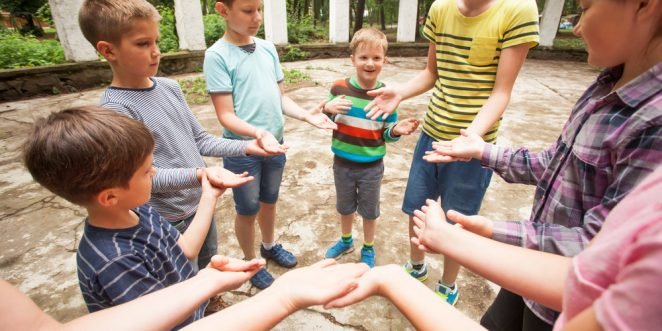For the design of a high-quality accompaniment by the educational specialists – The current crib expansion in Germany leaves the proportion of children and Familys, who experience this transition, rise sharply. At the moment, however, practical concepts are still lacking, and the question arises: How can this transition be dealt with professionally and how can parents be supported in this transition process in a needs-oriented manner?

Every person is confronted with transitions again and again in the course of their life. The most important transitions take place in early childhood:
- Family -> nursery
- Creche -> kindergarten
- Kindergarten -> primary school
And even after that, everyone experiences further transitions that represent changes and challenges in the course of life and that have to be mastered through change and adaptation. Transition processes can be perceived both positively and negatively and can be planned or unpredictable, which in turn can represent opportunities as well as risks.
The design of the transition between the crèche and the kindergarten can be described as an expression of the social system, which requires all participants in the upbringing and educational process to have a communicative and cooperative attitude. 1
Anchoring this topic conceptually can have a positive effect on the cooperation between the respective institutions and their participants, child – parent – educational specialist.
Parents play a dual role in this transition
It should be borne in mind that parents experience the transition phase twice. On the one hand, they help shape the transition of their child and, on the other hand, they themselves are involved in the transition and the associated changes. A relationship based on trust with the pedagogical specialist is therefore of great importance and can arise above all through a mutual dialogue that takes place right from the start.
The goal of professional transition support is to strengthen children and parents so that they can overcome the transition independently and independently. 2
But how can this be designed in a practical way and what exactly does a transition mean??
What is a transition or a transition?
The terms transition or transition refer to life events that an individual has to deal with at different levels. They bring about drastic changes in the life of the individual, which can be managed with social support and conscious learning processes. 3
Both terms are often used interchangeably, whereby the term transition makes clearer a theoretically sound and empirically verifiable basis. He takes into account different development tasks, the requirement profile and critical life events of an individual and, with his developmental psychological concept of transition, focuses on the identity development of those involved in the transition. 4
Transitions are understood to mean life events that both require coping with discontinuities and stimulating processes of accelerated learning. Here, coping with oneself and social support are of crucial importance, whether a transition is experienced as positive or negative by the individual.
Unique in a child’s life: transition from crèche to kindergarten
If a child attends a daycare center and is now about to switch to kindergarten, this is associated with a farewell on the one hand and a new start on the other. So the child, but also his parents, must say goodbye to the caregiver, the other specialists, the parents and children, and above all to the familiar environment. At the same time, they have to find their way in a new environment, get to know the new caregivers and the rules there. 5
Children are distinguished in the transition from daycare to kindergarten by their increased competence, which they have already acquired in many areas in daycare. They already bring with them group and facility experiences that support them in the transition process. 6
An intensive process: Farewell in the crèche
Due to the fact that crèche time is usually intensive, the processes of parting and separation are experienced very intensively on the part of the child and the parents. It is therefore important that parents receive clear messages at an early stage so that they can see kindergarten as new and therefore as a challenge at the individual level. The basic thing is that they feel safe by being taught, that you Child in the crèche, as in kindergarten, is supported with his farewell and new beginning. If parents know from the start that there are strong feelings about moving from daycare to kindergarten and that they are allowed, the transition will be easier for them. 7
The demands on the parents are also great at the relationship level, the interactional level. For example, they have to say goodbye to the pedagogical staff at the crèche and at the same time find that their child develops more self-confidence and, as a result, becomes more independent and demands more independence. In addition, the parents now have to integrate into a new parent group and may be afraid of social discrimination because their child was not cared for in the family until their third birthday. Parents are also experiencing changes in context. The groups in the kindergarten in which your child is now being cared for are larger. The personnel-child key is also often lower, and the strict hygiene regulations that were experienced in daycare are often looser in kindergarten. 8th
Requirements for pedagogical specialists in the transition process
In the transition process, the pedagogical specialists are particularly sensitive. This is the only way she can respond sensitively to questions, expectations and possible fears as well as the feelings of the parents. In the transition phase, parents can only give their child the necessary security that it takes for a successful transition if they feel that their questions are taken seriously as parents. 9
Due to the diversity of the transition, educational professionals first need detailed knowledge of what a transition is and what distinguishes it. This includes the knowledge of the professionals, e.g. relationships between parents and child or the emotional development of the child. Typical aspects of emotional turmoil and tension occur in the transition, which parents also experience very clearly. 10
A successful transition: the basis for working with parents
In addition, the key point in a successful transition is that parents continue to be present in the facility and are actively involved. As a result, it is important, among other things, to involve parents in the transition and to make it clear to them how they should behave in the transition process and what is expected of them. 11
Furthermore, the specialists of the institutions have to find interfaces between the institutions so that parents (and of course the child) can get to know the new environment and thus have knowledge and an idea of what will come later. 12 Likewise, educational professionals should with the Kindergarten children discuss the new admissions together in order to create a stimulating interaction environment between the children. Of course, this also applies to the parents, who can be invited to a parents’ evening so that they can also establish contacts between the different parents. Basically, it can be said that parents are an important source of supply for new parents. 13
Create a stimulating interaction environment
Specialists therefore have to create a stimulating interaction environment, also for parents. Thus, the parents should be offered a variety of opportunities to express their feelings, questions and concerns and thus to actively participate in the process. They should not only be seen as supporters of their child, but as independent adult copers. 14 You must, in terms of participation, in one "Dialogue from the start" be met at eye level. In the course of inclusive change, the heterogeneity of parents must be taken into account by the specialists. Keeping an eye on these and including them in the transition is a crucial criterion for a successful transition. All parents are needed to enable all children to have a good educational opportunity and career. 15
Conclusion
Against the background of § 24 SGB VIII coming into effect on August 1st, 2013, which provides for crèche entitlement for children from the age of 1, more parents will now be involved in the transition from crèche to kindergarten. The importance of the qualitative accompaniment of this transition must therefore come into focus, also because a successful early childhood transition has a positive effect on coping with further transitions. The dual role of parents in this transition process must not be neglected. With the help of education, training and further training opportunities on this topic, the pedagogical specialists can be specifically supported in this transition.
footnotes
1 cf. drizzle & Griebel 2000; Griebel & Drizzle 2011
2 cf. drizzle & Griebel 2000; Griebel & Drizzle 2011
3 cf. Griebel & Niesel 2004, pp. 35ff.
4 cf. Drizzle 2012.
5 cf. StMAS & IFP 2007, p. 114; Ministry of Culture of Lower Saxony 2012, pp. 78f.
6 cf. StMAS & IFP 2007, p. 114
7 cf. Griebel & Niesel 2011, p. 111; StMAS & IFP 2007, p. 114.
8 cf. Griebel & Niesel 2011, p. 111; StMAS & IFP 2007, p. 114.
RELATED ITEMS
-

Language nursery, kindergarten and crèche
We are a language day care center Language is the key to the world: we need it to communicate, play and learn. Wisenschaftliche…
-

Entry to kindergarten – a significant event for the family
Wilfried Griebel Renate Niesel Entry to kindergarten is a unique event not only for children, but also for parents…
-

Since October 2013 we have a crèche with 15 places for children aged 0 to 3 years. The new crèche was added to the existing one…
-

Kindergarten – all information about the different kindergarten models
A kindergarten is a day care center for children aged between three and seven years. There are different…
